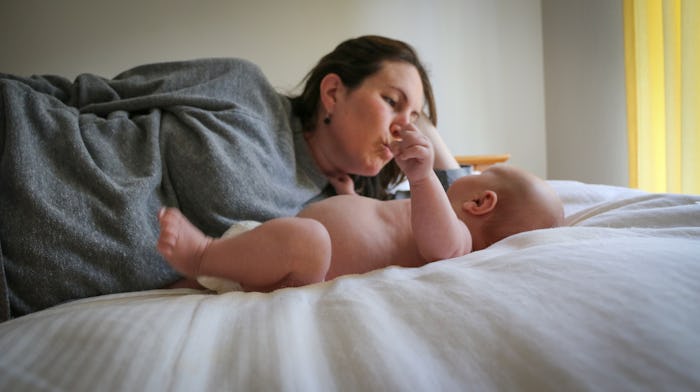Life

Childbirth Might “Cure” Preeclampsia, But The Risks Linger Per A New Study
Every day, about 830 women die from pregnancy- or childbirth-related complications that are entirely preventable, according to the World Health Organization. Among the top causes of maternal mortality is preeclampsia, a high-risk condition marked by high blood pressure and organ damage during pregnancy. Studies have shown that, although treatable, preeclampsia can go undetected in some pregnant women, increasing their risk of other serious health problems like heart disease down the line. Now, there's new research that links preeclampsia to a higher risk of cardiovascular issues in the five years postpartum, that reveals a gaping hole in our postpartum care system for women with preeclampsia and could go partway to explaining the postpartum deaths of mothers with preeclampsia.
A new study from the American College of Cardiology showed that pregnant women who were diagnosed with preeclampsia were far more likely to develop diabetes, high cholesterol, or high blood pressure within five years of giving birth, compared to pregnant women without the condition, according to ScienceDaily. Researchers also discovered that the affected women had higher rates of obesity, preterm delivery, postpartum complications, and babies with low birth weights at the time of labor. These findings suggest that preeclampsia increases the risk of heart disease later in life among mothers diagnosed with the condition, according to researchers.
But what's most alarming: The study found that, despite the heightened risk, most women who've had preeclampsia don't receive the necessary medical follow-ups to help prevent cardiovascular problems after the complication, according to Malay Mail Online.
The researchers theorize that, because delivering the baby "cures" preeclampsia and the symptoms usually resolve within six weeks post-birth, doctors and patients believe further monitoring is unnecessary. In fact, the study found that, of the women who followed up with their doctors after a preeclampsia diagnosis, only one of their charts indicated that the physician knew about said diagnosis and recommended long-term follow-ups related to heart health.
Lead author Karlee Hoffman, cardiology fellow at Allegheny Health Network, said of the findings in a news release:
As providers, we’re missing the boat if we’re not adequately following up with these patients on their cardiovascular risk factors. Women are highly motivated to take care of themselves when they are pregnant and after they deliver their babies, so it’s a great time to educate them on long-term cardiovascular risks and potentially intervene with aggressive lifestyle modification.
Preeclampsia affects between 5 and 8 percent of all births in the United States, and about 10 million women around the world each year, according to the Preeclampsia Foundation. But many pregnant women do not seek immediate medical care because of a lack of awareness of the high-risk condition and its signs and symptoms, the foundation noted.
The lack of care could have very real, dangerous implications: The World Health Organization lists preeclampsia, which usually appears in the second trimester, as one of five conditions that account for nearly 75 percent of all maternal deaths. In some women, preeclampsia can cause eclampsia, a serious complication categorized by one or more seizures either during pregnancy or in the postpartum period, according to the American College of Obstetricians and Gynecologists.
And, as the study has showed, not receiving proper medical attention may impact mothers who had preeclampsia in the long-term. A physician's failure to monitor subsequent conditions that increase a mother's heart disease risk could mean the onset of severe, even life-threatening cardiovascular problems. As Hoffman said:
The incidence of preeclampsia is relatively high and so is the risk of having a subsequent diagnosis of these cardiovascular risk factors. We need to work with our obstetrics and gynecology colleagues to capture these patients and refer them to a primary care doctor or a cardiologist for more rigorous follow-up to help prevent future cardiovascular disease.
Hoffman will present the findings at the American College of Cardiology's 67th Annual Scientific Session, taking place March 10-12 in Orlando, Florida.
Check out Romper's new video series, Bearing The Motherload, where disagreeing parents from different sides of an issue sit down with a mediator and talk about how to support (and not judge) each other’s parenting perspectives. New episodes air Mondays on Facebook.